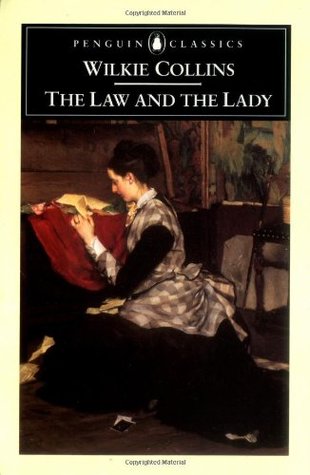The Law and the Lady. Wilkie Collins. 1875. 430 pages. [Source: Book I Bought]
The Law and the Lady may not be my favorite Wilkie Collins novel, but, I am glad I finally read this "first" female detective novel. Valeria is our heroine, our amateur detective. Readers meet her on her wedding day. Foreshadowing is abundant. All is not well. Things may never be well for this couple. Within days, Valeria is noticing inconsistencies and becoming super suspicious of her husband. She snoops in his things; she goes to his friends to ask questions, etc. She makes a DISCOVERY.
Her husband was married before. His first wife died. He was tried for murder--suspected of poisoning her by arsenic. The Scottish Verdict was "Not Proven" which essentially means that people, that society, could still choose to look upon him with suspicion as a murderer. He may not be "guilty" but he's not been deemed "innocent."
Once he knows that she knows his past, he leaves her. Valeria while seeming to be full of doubt and hesitation and fear BEFORE she discovered his past, is suddenly completely confident in her husband's innocence AND more in love with him than ever before. It seems her love for her husband has tripled since she read her husband's trial. She is now fiercely determined to prove that her husband is innocent, to take her proof to court.
Over half the novel is focused on Valeria's efforts to prove her husband's innocence. Valeria only has to talk to one or two people to know what's what. Getting proof that her intuition is right may prove slightly more challenging, but Valeria with a little help from others is stubborn enough to see the job through to the end.
Or is she? The Law and the Lady has a not-quite-satisfying ending. For her husband to "receive" justice, it means that someone else will be assigned blame. (That seemed obvious from the beginning.) And in the end, both husband and wife prove reluctant and hesitant to act.
The Law and the Lady is a strange novel with a strong heroine. As a romance, it was extremely weak. Valeria, readers are told, loves, loves, loves her husband. He is her EVERYTHING. But readers never see the husband at his supposed best. Readers just see Valeria in various dramatic scenes supposedly acting on her husband's behalf and with his best interests in mind. Because readers don't necessarily share faith in Valeria's husband or in Valeria's judgment, it could have easily gone the other way. Collins could have written this as a dark, dramatic piece with a less than happy ending.
© 2014 SukaYuka.com of SukaYuka's Book Reviews

No comments:
Post a Comment